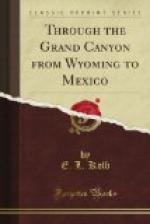By the time I had reached the spire-like mountainous rocks a few miles below the bridge, which gave the town of Needles its name, the sun was well up and I was beginning to learn what desert heat was, although I had little time to think of it as I was kept so busy with my boat. Here, the stream which was spread a mile wide above, had choked down to two hundred feet; small violent whirlpools formed at the abrupt turns in this so-called canyon and the water tore from side to side. In one whirl my boat was twice carried around the circle into which I had allowed it to be caught, then shot out on the pounding flood. Soon the slag-like mountains were passed and the country began to spread, first in a high barren land, then with a bottom land running back from the river. The willow bushes changed to willow trees, tall and spindly, crowded in a thicket down to the river’s edge. The Chemehuevi Indians have their reservation here. On rounding an abrupt turn I surprised two little naked children, fat as butterballs, dabbling in a mud puddle close to the stream. The sight, coupled with the tropical-like heat and the jungle, could well make one imagine he was in Africa or India, and that the little brown bodies were the “alligator bait” of which we read. Only the ’gators were missing. The unexpected sight of a boat and a white man trying to photograph them started them both into a frightened squall. Then an indignant mother appeared, staring at me as though she would like to know what I had done to her offspring. Farther along were other squaws, with red and blue lines pencilled on their childlike, contented faces, seated under the willows. Their cotton garments, of red and blue bandanna handkerchiefs sewed together, added a gay bit of colour to the scene.
Below this were two or three cozy little ranch houses and a few scattered cattle ranches, with cattle browsing back in the trees. All this time it was getting hotter, and I was thankful for my sheltering cover. My lunch, prepared in the morning, was eaten as I drifted. Except in a few quiet stretches I did little rowing, just enough to keep the boat away from the overhanging banks and in the strong current.
The bottom lands began to build up again with banks of gravel and clay, growing higher with every mile. The deciduous trees gave way to the desert growths: the cholla, “the shower of gold,” and the palo verde and the other acacias. Here were the California or valley-quail; and lean, long-legged jack-rabbits. Here too were the coyotes, leaner than the rabbits, but efficient, shifty-eyed, and insolent. One could admire but could hardly respect them.
I had entertained hopes of reaching Parker that evening, but supposed the hour would be late if I reached it at all. Imagine my surprise, then, when at half-past four I heard the whistle of a train, and another turn revealed the Parker bridge. I had been told by others that it had taken them three or four days to reach this point on a low stage of water. Evidently the high water is much better for rapid and interesting travel.




